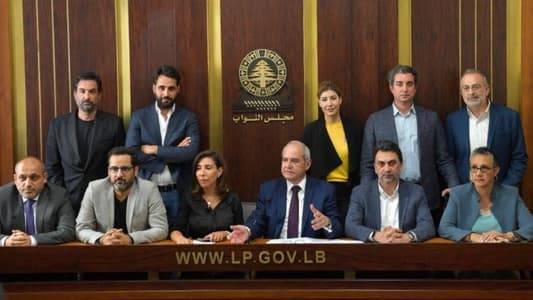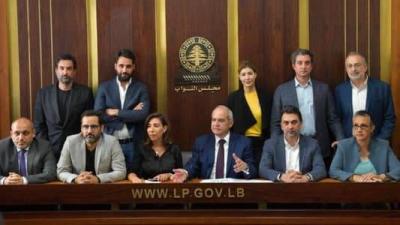Quickly, the hopes pinned on the "October 17" deputies and the desired change faded, as the seventh presidential round established a new positioning for what was once known as the "Change Deputies" or "The 13 Bloc." This occurred shortly after the clear objection recorded by deputies Wadah al-Saad and Michel Doueihi against the bloc's inability to agree on a common presidential candidate, followed by deputies Mark Duh, Najat Aoun Saliba, Yassin Yassin, Elias Jaradi, and Rami Fanj joining the ranks of dissenters, a day before the Constitutional Council announced a new "setback" for them by nullifying Fanj's candidacy.
Contrary to the general trend that highlights the unity of parliamentary blocs during important events, this bloc intentionally showcased the lack of cohesion among its members and the variety of their political choices during each "test." This was evident during the first parliamentary session to elect members of the council, as well as when designating a president to form the government, where deputies Halima Qaqour, Cynthia Zarazir, and Elias Jaradi abstained from naming Ambassador Nawaf Salam, while Deputy Ibrahim Mneimneh hesitated before eventually joining his colleagues in supporting Salam, who garnered 10 votes out of 13. This discord persisted during the election of committees in the parliament, with some insisting that parties of the ruling class should not participate in the parliamentary game or in forming alliances that would allow them to join or lead the committees, culminating in the presidential initiative that dramatically affected the unity of the "bloc."
The initiative launched by "The 13 Bloc" to attract other deputies to their cause and agree on a name from their presidential basket, which included Ziad Baroud, Nassif Hitti, and Salah Hnein, was undermined by the bloc's own members before others, widening the gap between them week after week. In the first presidential sessions, Selim Eddé (who was not a candidate) received 13 votes, before they settled on Dr. Issam Khalifeh, who received only 5 votes out of 13 during the seventh presidential session, amid Zarazir's absence from the parliamentary scene and the participation of Deputy Osama Saad in this front as well.
This led to the emergence of a new parliamentary bloc from the "13" comprising five deputies: Halima Qaqour, Ibrahim Mneimneh, Cynthia Zarazir, Firas Hamdan, and also deputy Osama Saad, who has the "apparent" support of deputies Melhem Khalaf and Paula Yacoubian, potentially raising its membership to 7 deputies. Meanwhile, the inclusion of deputies Mark Duh and Najat Aoun Saliba alongside Wadah Al-Saad and Yassin Yassin supporting Deputy Michel Moawad indicated a new political choice or alliance that would not be far from deputies Michel Doueihi and Charbel Massaad. Deputy Elias Jaradi, however, voted alone for former minister Ziad Baroud, one of the choices from the "change" initiative.
In the meantime, the joining of deputies from the "Progress" party, Mark Duh and Najat Aoun Saliba, to Moawad's presidential front went beyond simply voting for him. A document of understanding among them clarified that their support was the result of an agreement with the "Independence Movement" on several points that are considered a "positive step" capable of development... and addressing the roots of the ongoing crisis in all its dimensions, allowing the "October 17" uprising to continue through a cohesive and mature political proposal for serious change in Lebanon." They also partnered to establish the "Lebanese Opposition Front," which included groups and parties from "October 17," the "Independence Movement," and the "Lebanese Forces." It was also emphasized that "this front was the main platform for deepening political understanding and developing points of convergence between the protesters of October 17 and the rebels against the system following the collapse and explosion."
The document issued by "Progress" outlined their new positioning by "working together (with the "Independence Movement") to develop the "Tuesday parliamentary meeting" to enhance political and legislative coordination, including "the changers," "independents," and blocs closest to the proposal presented in this agreement," which also addresses participation in all new developments regarding the presidential election and reaching a consensus on naming a prime minister and taking a joint stance on how to engage with the government, either by participating in it and granting it confidence or withholding it.
Reviving the "Lebanese Opposition Front"
In light of this situation, the revival of the "Lebanese Opposition Front," which emerged from the "October 17" squares and includes deputies from the "Lebanese Forces," "Independence Movement," "Progress," and the "Project of a Human Nation," along with independent deputies including Charbel Massaad, who participated alongside Melhem Khalaf, Elias Jaradi, and others in the first episodes of the "Tuesday Meeting," stands out. Observers note that the divergence within the "13 Bloc" stems from conflicting political choices since the protests in the "October 17" squares, with the opposing "leftist" wing, primarily consisting of deputies Ibrahim Mneimneh, Halima Qaqour, and Osama Saad, steadfastly upholding the slogan "All means all," rejecting cooperation or coordination with any other parliamentary blocs, while failing to propose solutions or take the necessary reform measures. The same sources affirm that the coalition of deputies: Halima Qaqour, Ibrahim Mneimneh, Osama Saad, Cynthia Zarazir, and Firas Hamdan will continue to "sing" far from the political forces in a bid to gain popular dissent against the "sectarian system parties" in the upcoming electoral process, which also serves the electoral interests of Yacoubian and Khalaf, even if that leads to further deterioration in institutions and the disruption of their regular operations.




